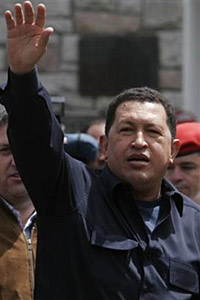 |
 |
 |
 Editorials | November 2005 Editorials | November 2005  
Why the Americas Summit Failed
 Olivier Knox - AFP Olivier Knox - AFP


| | Venezuela's president Hugo Chavez proclaimed a 'knockout' victory in the Summit of the Americas after helping thwart a U.S.-backed free trade zone, strengthening his position as Latin America's most vocal rival of President Bush and as a maverick unafraid of irritating his neighbors. (AP Photo/Dado Galdieri) |
US President George W. Bush and Brazilian President Luiz Inacio Lula da Silva celebrated warm US-Brazil relations Sunday but failed to banish differences on slashing trade barriers in the Western Hemisphere.

In a joint appearance after talks in the Granja do Torto presidential residence, the two leaders emphasized the importance and strength of good ties between the region’s two largest economies and democracies.

The leftist Lula, speaking via an interpreter, said that those who predicted deteriorating ties when he took office were “roundly mistaken. On the contrary: Our relations today are going through one of their best moments ever.”

“Relations between Brazil and the United States are essential, and they are strong,” said Bush, who was leaving later for Panama, the final stop on his first Latin-American trip, since he won reelection in November.

The talks came a day after Brazil and four other countries blocked Bush’s effort to convince 34 nations at a summit in Argentina to set a date certain to resume talks on the Free-Trade Area of the Americas (FTAA).

Brazil has said there is no point in doing so until after the so-called Doha Round of World Trade Organization (WTO) talks, which have bogged down over agricultural subsidies—which also bedevil the Americas trade debate.

Lula called US aid to its farmers “unjustified barriers to our bilateral trade” and that he and Bush had explored their differences “without surprises or confrontations.”

“The President said ‘look, let’s work together on Doha, and see how that goes, and we’ll continue working on the free-trade agreement of the Americas,’” said Bush, who was making his first visit to Brazil.

Before a deal can be made, “he has got to be convinced, just like the people of America must be convinced, that a trade arrangement in our hemisphere is good for jobs, is good for the quality of life,” the US President said.

Bush has said that the United States has offered to eliminate US agricultural subsidies but can only do so if other large trading partners agree—specifically the European Union, which has resisted.

“We agree that the reduction with a view to the elimination of agricultural subsidies will be a key” to the WTO talks, said the Brazilian leader.

Earlier, in a roundtable with prominent Brazilians, Bush shrugged off the sometimes violent protests he attracted at the summit in Argentina, saying: “I expect there to be dissent. That’s what freedom is all about.”

“People should be allowed to express themselves. And so what happened in Argentina happens in America. That’s positive,” said Bush, who charged that some anti-US opinions of him were due to “a view of America that is, in my opinion, not an accurate view.”

Outside the residence where Bush and Lula met, some 200 protesters chanted “Fascist Bush, the real terrorist” and burned an effigy of the US President dressed in a shirt with a swastika.

Bush hoped to enlist Lula’s help in pressuring the European Union to agree to deeper cuts in import duties on agricultural products ahead of critical December talks that may decide the Doha round’s fate.

“When Brazil speaks, people listen carefully,” the US President told reporters last week.

Bush and Lula had also been expected to discuss reform of the United Nations. Brazil, along with Japan, India and Germany, has sought permanent membership on the UN Security Council.

Without wanting to join the militant Cubans and Venezuelans in shouting anti-American rhetoric, many South Americans believe that basic reforms in the global economy to tilt the balance toward the poorer countries should first be made before they are tied to free-trade commitment that might end up disadvantageous to them. | 
 | |
 |



